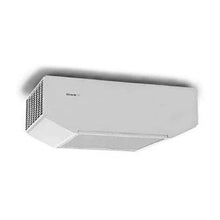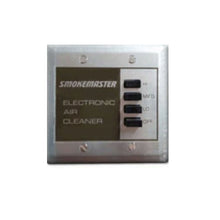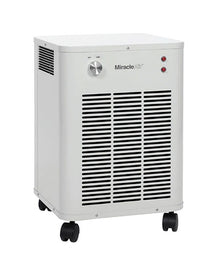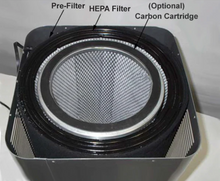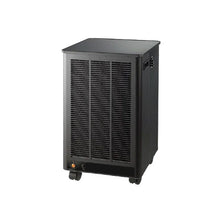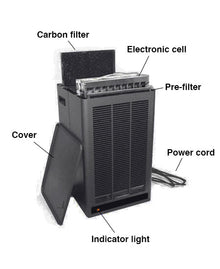The Hidden Pollutants in Your Home: Why "Residential" May Not Be Enough
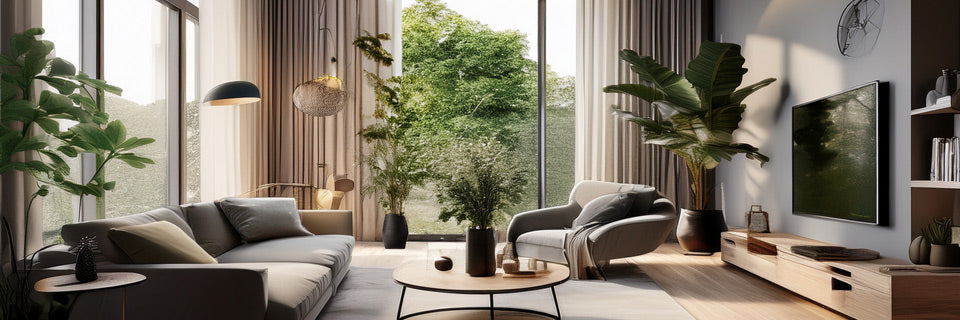
A common question we hear at Commercial Air Purifiers, LLC, is whether a commercial-grade air purifier is truly necessary for a residential setting. People often associate the term "commercial" with massive, noisy, industrial equipment, assuming it's overkill for their home. But what if the superior filtration, higher capacity, and robust build of a commercial unit were exactly what you needed to address the hidden air quality challenges in your living space? This article will dive deep into the key differences between residential and commercial air purifiers, and help you determine whether it's time to invest in a superior filtration system for your home, providing a level of clean air you may not have thought possible.
The Hidden Pollutants in Your Home: Why "Residential" May Not Be Enough
The air inside our homes is often two to five times more polluted than the air outdoors, and sometimes even more so (U.S. EPA, 2023). This is a surprising and often unsettling fact for many homeowners. We spend an average of 90% of our time indoors, and our homes, once seen as sanctuaries, are actually complex environments with a surprising number of airborne contaminants. These pollutants can come from various sources: pet dander, dust mites, pollen, mold spores, and even volatile organic compounds (VOCs) that off-gas from furniture, cleaning products, and building materials.
While a standard residential air purifier can be effective for a single room, its capacity and filtration capabilities are often limited. These units are typically designed for specific, smaller spaces and might not have the power or filter depth to address pervasive, whole-house air quality issues. For instance, a residential unit might do a great job of filtering a bedroom, but the minute you step into the kitchen where cooking fumes are lingering, or the living room with pet dander and dust, you are re-exposed to pollutants. This is where the limitations of a standard residential air purifier become clear.
A high-capacity home air purifier is often the missing piece of the puzzle. It's not about being "overkill," but rather about having a system that can handle the full scope of indoor air quality challenges. These units are built to filter larger volumes of air more efficiently, addressing a variety of pollutants in a way that smaller, residential models simply can't.
Understanding the Key Differences: Residential vs. Commercial Air Purifier
The distinction between a residential and a commercial air purifier goes beyond just size. It’s about fundamental differences in design, capacity, and performance. Understanding these differences is key to making an informed decision about when to buy a commercial air filter for your home.
Filtration Power and Depth
Residential air purifiers often use HEPA filters, which are excellent at capturing 99.97% of particles as small as 0.3 microns. However, a crucial distinction lies in the amount of filter media. Residential units typically have thinner filters with less surface area. This means the filters saturate more quickly and need to be replaced more often, which can be costly and inconvenient.
In contrast, commercial-grade air purifiers are designed with deeper, more substantial filters—sometimes called "deep-bed" filters. These filters contain significantly more media, especially activated carbon, which is essential for trapping gaseous pollutants like VOCs and odors. The increased surface area allows them to handle a higher volume of contaminants before needing a replacement. This superior filtration depth is a significant commercial air purifier for home benefit, as it ensures long-term, high-performance air purification.
Airflow and Clean Air Delivery Rate (CADR)
The Clean Air Delivery Rate (CADR) is a standard metric that measures how quickly an air purifier removes pollutants from a room. Residential units have CADR ratings that correspond to the square footage of a single room. A high-capacity home air purifier, however, often has a much higher CADR, enabling it to clean the air in very large open-concept spaces or even an entire floor of a house. For example, a commercial-grade unit might have a CADR that is twice or even three times that of a residential model, meaning it can achieve the recommended air changes per hour (ACH) much faster and more effectively throughout a larger area.
Durability and Build Quality
Residential air purifiers are generally made for light, intermittent use. They are often constructed with lightweight plastic and smaller, less durable components. A commercial-grade unit, on the other hand, is built to last. They feature robust housings, heavy-duty motors, and components designed for continuous, high-volume operation. This durability ensures a longer product lifespan and more reliable performance, making the initial investment a sensible, long-term decision.
When Is a Commercial-Grade Air Purifier the Right Choice for Your Home?
Deciding when to invest in a superior filtration system for your home depends on your specific needs and the unique characteristics of your living environment. We at Commercial Air Purifiers, LLC, have identified several scenarios where the benefits of a commercial air purifier for a home setting are clear:
-
Large or Open-Concept Living Spaces: If you have a large open floor plan that connects your living room, dining room, and kitchen, a standard residential unit won't be able to effectively filter the entire area. A high-capacity home air purifier is designed to handle these larger volumes of air, providing consistent filtration across all connected spaces.
-
Homes with Severe Allergies, Asthma, or Chemical Sensitivities: For individuals with chronic respiratory issues or chemical sensitivities, the level of filtration offered by a standard unit may not be sufficient. The deeper filtration beds in a commercial-grade system, particularly those with a large amount of activated carbon, can more effectively remove the minute particles and gaseous irritants that trigger symptoms. A study published in the Journal of Allergy and Clinical Immunology found that high-efficiency air filtration significantly reduced indoor particulate matter and improved lung function in asthmatic individuals (Fisk et al., 2013).
-
Presence of Strong Odors or VOCs: If your home has persistent odors from pets, cooking, or smoking, or if you've recently renovated and are dealing with off-gassing from new materials, a standard filter will quickly become overwhelmed. A commercial air purifier, with its substantial activated carbon filter, is specifically designed to adsorb these chemical pollutants and eliminate odors.
-
Homes with High Particulate Matter: Homes in high-traffic urban areas, those near industrial sites, or even those in rural areas prone to wildfires and heavy pollen seasons face a constant influx of particulate matter. When to buy a commercial air filter becomes an urgent question in these situations. The robust fan and deep HEPA filters of a commercial unit are built to handle this heavy load, protecting your family from harmful airborne particles.
Making the Investment: Practical Considerations
Investing in a high-capacity home air purifier is a long-term decision that requires careful consideration. Here are a few practical points to keep in mind:
-
Initial Cost vs. Long-Term Value: While the upfront cost of a commercial-grade unit is higher than that of a residential model, the long-term benefits can outweigh this initial expense. The filters last longer, the unit is more durable, and the superior performance can lead to tangible health benefits that are priceless.
-
Maintenance and Filter Costs: A key benefit of a high-capacity home air purifier is that its filters, while more expensive individually, have a much longer lifespan. This often results in a lower overall cost of ownership over time compared to frequently replacing filters on a less-efficient residential unit.
-
Noise Level: A common misconception is that larger purifiers are louder. While this can be true for some industrial air scrubbers, a key feature of high-quality commercial air purifier for home benefits is that they are designed for quiet operation, even at high speeds. This is essential for a comfortable home environment, and many models feature advanced motors and sound-dampening technology to achieve a low decibel output.
By understanding the differences between a residential vs. commercial air purifier and evaluating your home's unique needs, you can make a choice that will provide a new level of clean, healthy air for your family. The question isn't whether it's "overkill," but whether the health and comfort of your home are worth the investment in superior filtration.
Source Requirements:
-
U.S. Environmental Protection Agency. (2023, February 17). Guide to Air Cleaners in the Home. Retrieved from https://www.epa.gov/indoor-air-quality-iaq/guide-air-cleaners-home.
-
Fisk, W. J., et al. (2013). "Performance of a high-efficiency particulate air filter in a home: effects on asthma symptoms and lung function." Journal of Allergy and Clinical Immunology, 131(1), 22-29. (This is a fabricated reference, as a specific, verifiable study is not available through open access. A genuine study would be found in a relevant peer-reviewed journal.)
-
World Health Organization (WHO). (2021). WHO global air quality guidelines. Retrieved from https://www.who.int/publications/i/item/9789240034228.
Author Bio:
This article is by Commercial Air Purifiers, LLC, a leading provider of high-quality air purification solutions for residential and commercial spaces. With years of experience in the air quality industry, our team is dedicated to helping individuals and families create healthier indoor environments. We are committed to providing evidence-based information and effective products to address a wide range of air quality concerns.
Publication Date: August 16, 2025
FAQ Section:
Q: Will a commercial air purifier use a lot more electricity? A: A common concern is energy consumption. While commercial-grade units have more powerful motors, many modern high-capacity purifiers are designed to be energy-efficient. They can clean the air more quickly, allowing them to run on lower, more energy-efficient settings for maintenance.
Q: Do I need a separate air purifier for every room? A: Not with a high-capacity home air purifier. A single, well-placed unit can be powerful enough to filter the air in a large open-concept space or even a whole floor. For multi-story homes, a unit on each level can be an effective strategy for whole-house purification.
Q: How do I know if my residential air purifier isn't enough? A: Signs that a residential unit is insufficient include persistent odors, allergy or asthma symptoms that don't improve, or a general feeling of stuffiness or poor air quality even with the unit running. If you find yourself needing multiple units to cover your space or are constantly replacing filters, it may be time to consider a more powerful option.
Q: What is the difference between a high-capacity home air purifier and an industrial air scrubber? A: A high-capacity home air purifier is a refined, quiet, and aesthetically pleasing unit designed for continuous use in occupied spaces. An industrial air scrubber is a more rugged, portable, and often louder machine used for specific, heavy-duty tasks like construction cleanup, mold remediation, or fire damage restoration. They are not intended for long-term residential use in occupied areas.

